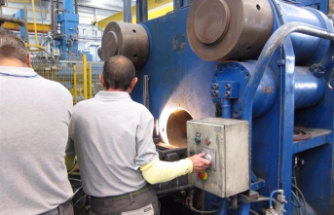Authorities said a man suspected of killing a Whittier police officer in a shootout Monday, hours after slaying his cousin, was recently released from prison and was under supervision of county authorities under Assembly Bill 109, a controversial program that many law enforcement agencies blame for an uptick in crime.
Michael Christopher Mejia, 26, of Los Angeles, was identified Tuesday by authorities as the suspect in the fatal shootings of Whittier police Officer Keith Boyer and 46-year-old Roy Torres, the suspect’s cousin.
Related story: Suspect in death of Whittier officer also shot cousin in East L.A. home, family says
Lt. John Corina of the Los Angeles County Sheriff’s Department Homicide Bureau said Mejia was released from state prison in April 2016 following a grand theft auto conviction in 2014. He was on probation under AB 109 when he allegedly shot and killed Boyer and Torres, Corina said.
Mejia had been arrested as recently as Feb. 2 for violating his probation, according to Los Angeles County booking records. He was released on Feb. 11. It was his fifth arrest since July 2016, according to the records.
Signed into law in 2011, AB 109 mandated “realignment,” which shifted nonviolent offenders from county jails to state prisons, or placed them on probation. It was a response to a Supreme Court order declaring the condition of California’s overcrowded prisons as violating the constitutional rights of inmates.
But AB 109 has also come under intense criticism from law enforcement agencies who say they’ve seen an increase in violent incidents against police officers, as well as property crimes, following its passage. Whittier Police Chief Jeff Piper was among those pointing to the law Monday. “We need to wake up. Enough is enough. You’re passing these propositions, you’re creating these laws. ... It’s not good for our community (and) it’s not good for our officers,” Piper said at a press conference where he identified Boyer.
Related story: Thousands gather at vigil for Whittier Police Officer Keith Boyer
Others have said there’s still no evidence that AB 109 is behind a spike in crime in California. A 2014 report by the Center of Juvenile and Criminal Justice said it couldn’t find a pattern of crime increases related to realignment. Mejia is suspected of fatally shooting Boyer, 53, and wounding his partner Officer Patrick Hazell in a shootout that began around 8 a.m. when the two officers responded to a traffic collision at Mar Vista Street and Colima Road.
Authorities said the suspect rear-ended two vehicles stopped at the intersection while he was driving the car he stole from Torres hours earlier.
When officers arrived and approached the suspect, Corina said Mejia pulled out a hand gun from his waistband and shot at both Boyer and Hazell, striking both of them. Mejia was also struck during the brief gun battle.
Mejia is suspected of also fatally shooting Torres a few hours earlier in the 1400 block of Volney Drive before stealing his car.
Los Angeles County booking records show Mejia was arrested by law enforcement five times since July. Corina said the majority of those arrests were for violating his probation.
He was not sure what the violations were, but said they “were all different incidents.”
Mejia has not been charged in either of the Monday killings. Corina said he remains in the hospital and is on a “flash incarceration” hold, a period of detention in county jail due to violations of probation. These holds typically last for up to 10 days, according to state law.
In 2010, Mejia was convicted of robbery and sentenced to four years in prison, according to court records. His 2014 conviction came with a two-year prison sentence.
Under AB 109, felons are considered eligible for release from state prison if the current conviction they’re serving time for is nonviolent.
This story is developing.
Our editors found this article on this site using Google and regenerated it for our readers.













